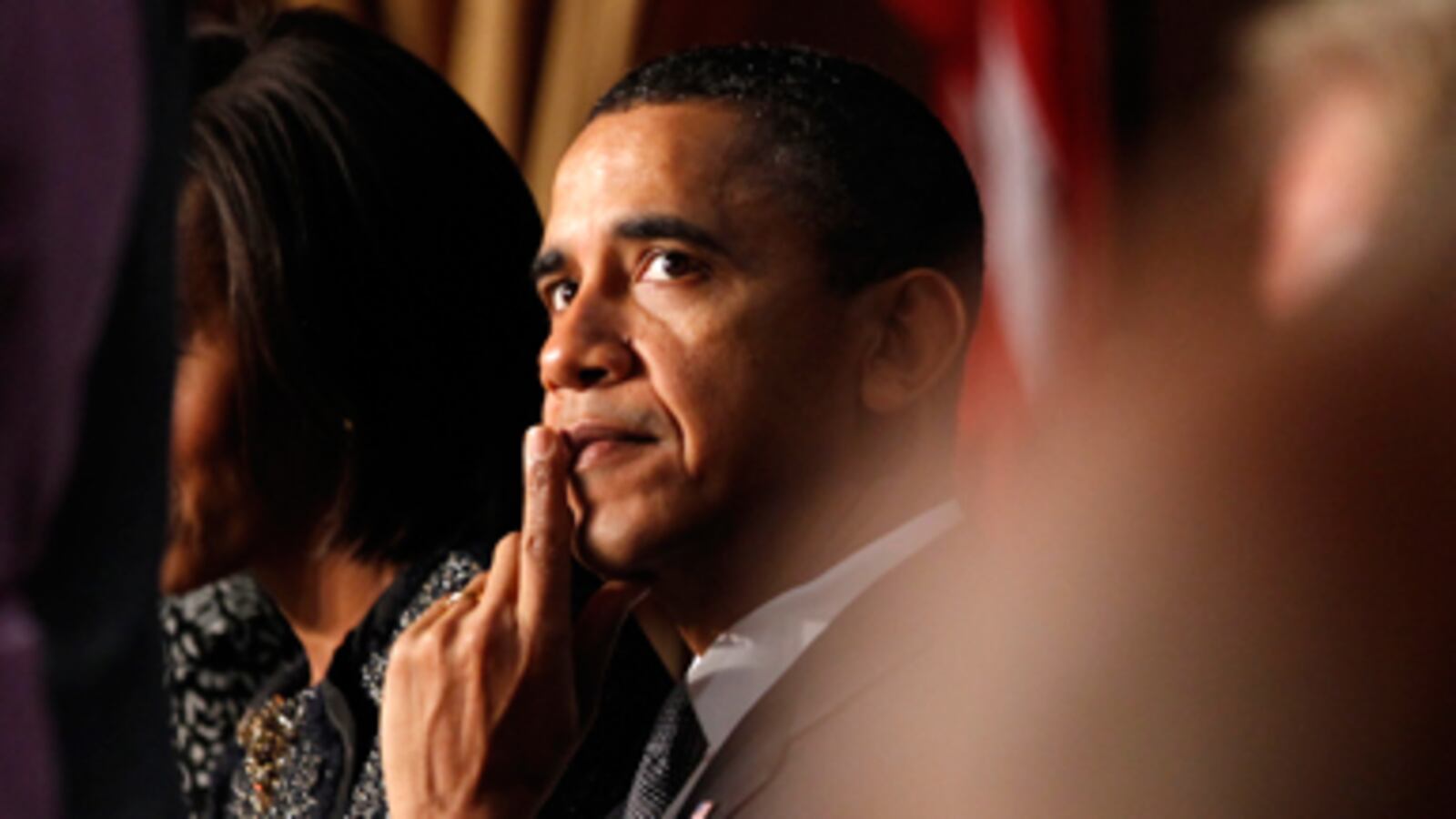President Obama was in the Oval Office, poring over a stack of legal memos.
It was several days before the announcement that the administration would no longer vouch for part of the Defense of Marriage Act, and the former constitutional law professor was reviewing the arguments before the Justice Department for an upcoming Massachusetts case.

With top staffers more concerned with the political impact of halting prosecutions under the marriage law—and whether it would complicate negotiations with Republicans about avoiding a government shutdown—Obama summoned his senior advisers to a meeting. It might not be pretty, he told them, “but it’s the right thing to do.”
The administration’s decision to effectively rule part of the law banning same-sex marriage unconstitutional caught Washington off guard. Even gay-advocacy groups that work closely with the White House didn’t get more than an hour’s notice of a change that many had been pushing for over the last year-and-a-half.
The DOMA decision was the latest in a series of administration moves on the politically sensitive issue. Last spring, Obama ordered hospital visitation rights for same-sex couples. In December, the administration devoted significant time to pushing for the repeal of the military’s Don’t Ask, Don’t Tell policy, which barred gays from serving openly. Administration officials also point to Obama’s decision to host the first-ever gay-pride event at the White House last fall.
This sequence of changes cannot be by accident, but represent a calculated assessment that standing up for gay rights is no longer as toxic as it might have been in 2004, when George W. Bush ran for reelection by pushing a constitutional amendment to ban same-sex marriage. In fact, the Republican response to Obama’s DOMA bombshell was strikingly muted.
Mike Huckabee, an evangelical Christian, said only that it was “very disappointing.” Newt Gingrich criticized the move only by implication, arguing that if President Sarah Palin had tried to invalidate the abortion ruling in Roe v. Wade, The New York Times would call for her impeachment. Speaker John Boehner, who originally called Obama’s decision “outrageous,” waited more than a week before announcing that a group of congressional leaders would discuss how to handle the law’s enforcement.
“This remains one of my highest priorities,” the president said, according to two people in the room. “We’re going to get it done.”
“The wedge has lost its edge,” says Mark McKinnon, a former Bush adviser who is also a contributor to The Daily Beast. New polling from the Pew Research Center shows that support for hot-button gay issues like marriage rights are now at an all-time high of 45 percent of the country, up 10 points over the last two years.
Publicly, the White House says gay issues have always been a top priority. “From day one, the president has made clear his decision on fairness and justice and equality for all Americans, including those who are gay,” says senior adviser Valerie Jarrett. “On these issues he hasn’t wavered one bit.”
Another official says that Obama has taken a heightened personal interest in matters important to the gay community as pressure has eased over more urgent matters like the economic recovery and terrorism.
For the most part, gay advocates have been pleased with the administration. That’s a major shift from a year ago, when LGBT issues weren’t getting the attention some advocacy wanted. “We felt disrespected last year,” said a spokesman for one group, who requested anonymity to criticize administration officials. “But over time, they’ve come to appreciate the compelling arguments we have.”
Since last fall, leaders of several groups have seen their influence grow. A coalition that usually includes the Human Rights Campaign, the Center for American Progress and the Servicemembers Legal Defense Network was generally granted monthly meetings early in the administration. But last summer, after top leaders registered their displeasure with Obama for failing to pursue the promises he made during the campaign, the monthly meetings turned into weekly ones. Joe Solmonese, the president of HRC, says that’s a big deal, especially considering he wasn’t invited to the Bush White House once. “There are lots of people close to the administration we can now count on to take messages to the president,” says Evan Wolfson, president of gay-advocacy group Freedom to Marry.
A cadre of mid- and high-level officials have personally taken control of issues such as gay marriage and lesser controversies. Some, like Jarrett and chief counsel Bob Bauer, have regular access to the president and review over his schedule. But Obama himself has also been involved at times. In early December, after the repeal of Don’t Ask, Don’t Tell failed as part of a larger defense bill, the prospects for overturning the policy looked grim. In a meeting in the Roosevelt Room with senior staff, several group leaders discussed possible ways to revive the repeal effort, including a stand-alone bill.
It came as a surprise when Obama walked into the room, especially when he sat down and reassured the group. It’s always darkest before dawn, he told them. “This remains one of my highest priorities,” the president said, according to two people in the room. “We’re going to get it done.” Two weeks later, Congress approved the measure.
Still, the gay community has a long list of demands for the White House—starting with offering benefits to the children of gay federal employees. But the crown jewel is still the federal endorsement of gay marriage, which remains an issue decided solely by the states. Obama’s reticence on the issue isn’t the only obstacle. The federal law that delegates marriage decisions to the states would have to be changed by Congress or the Supreme Court. But the president taking a public stance in favor of same-sex marriage would have an undeniable impact.
Senior officials won’t talk on the record about Obama’s process of “grappling,” as Press Secretary Jay Carney called it last month, with the idea of allowing gay people to marry. But to push Obama to change his mind, gay advocacy groups have been strategizing how to get to convince him that it is politically safe to commit himself.
A potential ally in that pursuit: Jeremy Bernard, who was recently appointed White House social secretary, and who is openly gay. The job involves managing the residence of the mansion and guarantees considerable face time that’s both informal and off-the-record with the first family. “Not to put the weight of the world on his shoulders,” says one group leader, “but don’t underestimate the level of candid and personal conversations he’ll have with the president.”





